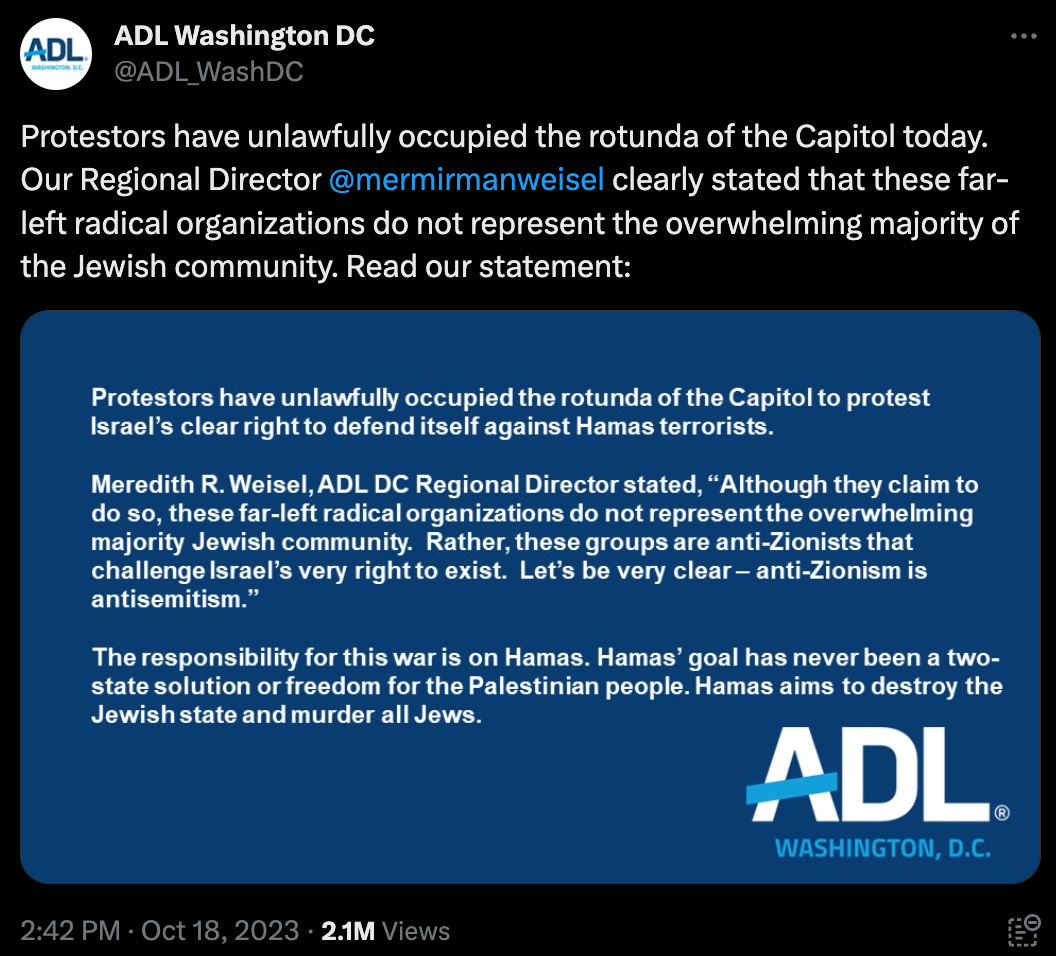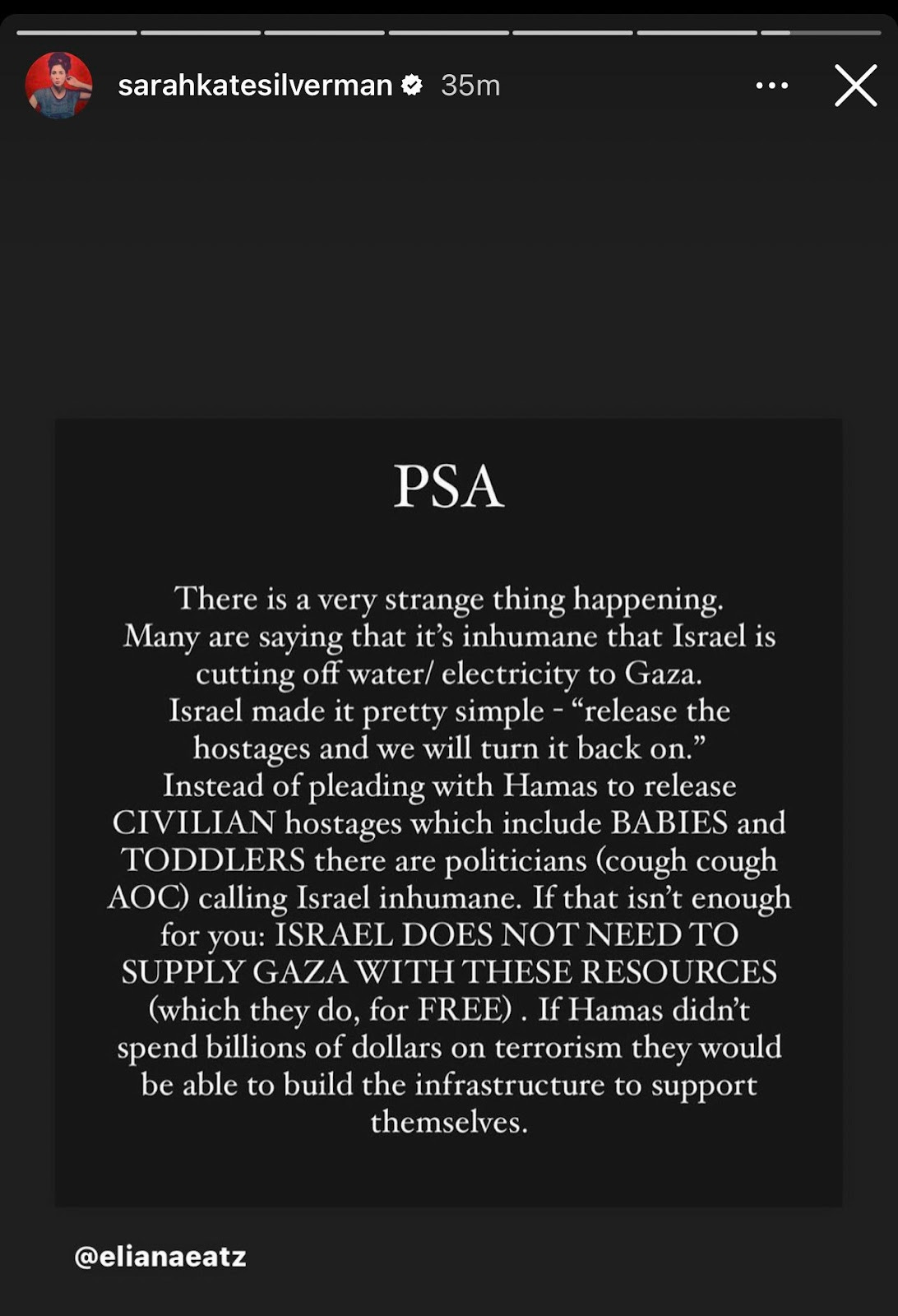Read:
Relevant Toon:
Ceasefire Now:
Surprisingly, it seems like a majority of American people (according to one poll, to be clear) want to allow aid to be sent to Gaza.
This is a huge shift, and seems to directly undermine what most politicians, even those ostensibly progressive (ahem, John Fetterman) are peddling publicly, aside from a brave but predictable few who are loudly calling for ceasefire and being vehemently slandered as a result. Most politicians, especially our newly face-lifted Joe Biden, loudly continue the American tradition of supporting, arming, and entwining with the Israeli ethnostate project and all that it entails, from military capacity to surveillance programs.
I will not purport to be a geopolitical expert, but I can speak to my experience and observation of being a lefty Jew speaking in support of Palestine, and why people react the way they do. Years ago I made a cartoon that asserted a fundamental truth I still believe in: criticizing Israel is not antisemitic. Usually I get at least a few comments about being a self-hating Jew when I speak in support of Palestine, which is par for the course and also strange: it is because of my (albeit tenuous) connection with Judaism and what it stands for that I believe so fiercely in the freedom of Palestinians, and occupied people struggling for liberation around the world. Our history of oppression as Jews should inform our response, and it does, but not in the way that it should.
Of course it’s possible to criticize Israel and be antisemitic at the same time, but the overall point here is that the Jewish people are not the government of Israel, and to insinuate such is in itself antisemitic. The dogged attempt to conflate all dissent and criticism of an extremely powerful nation that is openly engaging in war crimes with antisemitism is one of the most effective tools of silencing support for Palestine—no one wants to be antisemitic, and hey if even seemingly “real” nonprofits and (AI)PACS claiming to help Israel, speak for Israel (none of these are ever good, for the record) are loudly telling you that you’re a bigot for saying something in support of Palestine, you might wobble in your resolve. Careful, don’t hurt big bad Israel’s feelings, or the IDF will tweet at you until you feel sad! And/or lose your job!
The successful rebranding and weaponizing of “antisemitism” to quell dissent is an embarrassment, not to mention its thorough undermining of any real threats to Jews by diluting and confusing the meaning. It is not antisemitic to say that Israel and its extremely right-wing government are, with great help from the U.S., a military and intelligence powerhouse that is openly genocidal in its willingness to both assert and act on vast, inhuman, and thorough extermination of the Palestinian people.
As a way of coping / processing the world at the moment, friends and I have been sending each other the worst posts we’ve seen, which yikes for me, seem to mostly come from famous Jewish women.
And while I do not believe that looking to celebrities or mainstream (i.e. “they’re in every commercial now” type) comedians is a viable means to form astute analysis, the posts of celebs and how people respond is often illustrative. They function as a useful, and very public, gauge and litmus test to see how a certain segment of the population is responding, and crucially, what sort of information they are most often seeing on their feeds.
Relevant Writing:
Do You Want Celebs to Have Good Takes?
Sometimes when I see fleeting references urging people/celebrities to “use their platform” on social media I see a singular image in my mind: that of John Cusack in Say Anything standing outside his love’s bedroom window, boombox above his head, Peter Gabriel playing as he does.
I know that looking at what Amy Schumer and Sarah Silverman are posting right now is 1) a mistake and 2) not important but also, it does feel useful for gleaning how a certain segment of the population feels. In tandem with the idea that criticizing Israel is antisemitic, there is also the oft-repeated lie that any public protest or outpouring of support for Palestinians is, somehow, implicitly making Jews—in America—unsafe. Not only does this deter from the fact that many Jews are active in the struggle for Palestinian liberation, it is also baffling: what do people like Amy and Sarah feel they are being attacked for? It is likely not for being Jewish, but for having inhumane opinions, but this crucial point is lost along the way.
Amy’s post is especially haunting: clearly she didn’t make it, there are ample incredibly cringe pro-Israel accounts that are, I’m sure, posting all sorts of nonsense at the moment. (Why You’re Being Gaslit by Gaza, 1/1000). Amy’s post echoes a sentiment that seems common in a type of (mostly older) Israel-supporting “liberal” Jew—that she tirelessly fights for equality for everyone else (lmao) but when it comes to the Jews, she’s alone. I wonder if Jews who feel lonely in this fight wonder why that is. Perhaps that loneliness comes from proudly standing on the wrong side of a relatively straightforward human rights issue.
To feel alienated, attacked, alone—are these indicative of being persecuted for religion, or for being held to account for supporting a project which is not for the safety and freedom of the Jewish people, but for the consolidation of land and power?
Sarah’s post, now deleted, also didn’t come from her, and is one of the most insane things I’ve ever read. What level of delusion do you have to be at to think this is cogent, let alone something for sharing, let alone a call to action? Her response was even weirder, blaming both being high and also menstruation, on her unbelievable post. To be clear, I am often both high and menstruating and I’ve never found that it turns my brain into a Geneva Accords defying soup.
And while we should not look to celebrities for their political takes, I think we can agree that Macklemore did it very well, which is eerie: when celebrities post nonsense, they become indicative of what a portion of the population seems to rally behind. And when they are clear and level, they suddenly become more persuasive and reasonable than most of our politicians.
I will hopefully write something more comprehensive soon, but felt it was urgent to make a clear and firm assertion that civilian loss of life anywhere is tragic, and that war should be avoided everywhere at absolutely all costs.
I am proud of my Jewish friends who are loudly showing up and speaking out in solidarity with our Palestinian brothers and sisters. And I can only hope that Jews who don’t feel this way, who feel lonely or isolated because they believe in Israel’s right to exist, can divorce themselves from the propaganda and lies, and more ultimately, take the time to think about what it means for a nuclear-armed global state fanatically invested in being an ethnic enclave, to be a weighty token of ones identity. What form of Judaism is one that doesn't act as an arbiter for justice and peace, both spiritually and in the world around it, and is that really worth supporting?








